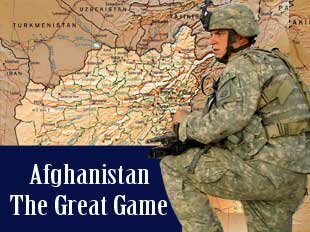|
News | Iran Travels | Iran Professional Services | About | Contact | Discussion Forum | Archive |
|
HAMSAYEH.NET |
| IRAN & INTERNATIONAL NEWS | CONTACT | ABOUT |
|
|
The Stray Bullet Theory
|
||
|
|
|||
|
The proof of that is in Obama’s ludicrous insistence that the war in Iraq was a diversion from our main task of… overthrowing the Taliban. There seems to be no argument about this. by Robert Logan, July 03, 2010 Antiwar Since the invasion of Afghanistan for the purpose of overthrowing its government, I have wondered what to call the stupidity of the operative theory. There is no superior strategy for getting Bin Laden than the strategy of getting Bin Laden. Anything other than that is hoping he will be hit by a stray bullet. The absurdity of this approach is not figurative – it is literal. Since our army was sent to Kabul and not Tora Bora where Bin Laden was hiding, a bullet would have to stray more miles off-course than a gun can fire. Sometimes you can get proponents of Bush and Obama’s war to admit that we should have focused a little bit harder on getting Bin Laden. But it never seems to extend far enough to admitting the strategy of overthrowing the government of Afghanistan was wrong in the first place. The proof of that is in Obama’s ludicrous insistence that the war in Iraq was a diversion from our main task of… overthrowing the Taliban. There seems to be no argument about this. Afghanistan did not attack us. Neither did Germany, where the plot was organized and financed from. Neither did Saudi Arabia, where most of the hijackers came from. Neither did the U.S. government, where under the watchful eye of FBI agents bitterly complaining to their superiors, the 9/11 hijackers trained. Neither did the Philippines, which has the most solid linear connection to 9/11 - The Bojinka Plot was hatched there, and it was by Ramzi Yousef who had already personally bombed the WTC and is nephew to Khalid Sheikh Mohammed, the mastermind of the modified Bojinka attack on 9/11. I’m sure that TV-trained readers will object that the Taliban was sympathetic to Al Qaeda back then whereas all these governments were not. But how does overthrowing the Taliban get Bin Laden? It won’t, and it didn’t. One of the most cunning aspects of stray bullet salesmanship is never detailing the Stray Bullet Theory directly or completely. Were they to do so, it would sound silly on the face of it: we are going to capture or kill Bin Laden by placing the army a hundred or even a thousand miles away from him. Instead our government and stenographers in the mainstream media have been masterful in the use of deceptive terminology, incessantly linking "Al Qaeda and Taliban" as if it were a noun for a single thing. It isn’t a stray bullet if they are the same entity, so the fact it is a Stray Bullet Theory is obfuscated rhetorically. If you object to overthrowing the government of Afghanistan, you will be met with an avalanche of retributional fury: the Taliban "hosted" Bin Laden; they’re evil towards women, etc. – But none of this explains how Bin Laden is captured or killed by occupying Kabul. When Bin Laden dies of old age or renal failure, the wrong war grinds on because the stupidity of the original strategy has never been questioned. We committed ourselves to overthrowing the Taliban government of Afghanistan, not to capturing or killing the perpetrators of 9/11. We did not lose track of the right objective by invading Iraq as Obama stated in his election sloganeering. We never had the right objective in the first place, and pretending we did by merely replacing the generals running a misguided war in Afghanistan will only result in endless loss of blood and treasure.
|
One of the most cunning aspects of stray bullet salesmanship is never detailing the Stray Bullet Theory directly or completely.
|
||
Disclaimer: Opinions expressed on this site are solely Hamsayeh.Net’s own and do not represent any official institutions’, bodies’, organizations’ etc. Similarly, Hamsayeh.Net
would not be responsible for any other opinions that may be expressed therein by other sources through direct or indirect quotations.


